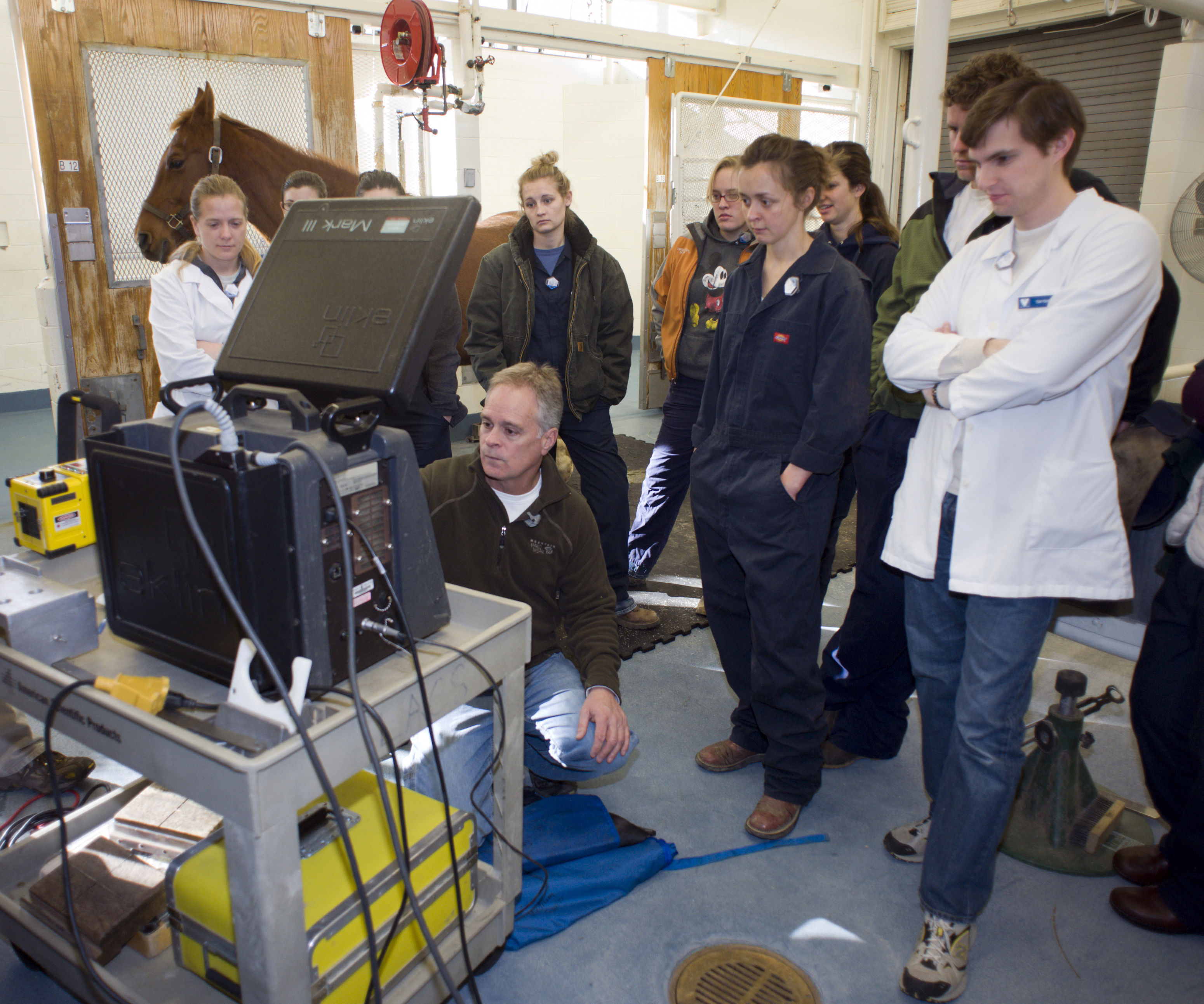Equine Field Service uses teamwork, technology to treat local horses

Chris and Christina Lee of Roanoke, Va., are passionate horse lovers who are deeply concerned about the care and treatment of their own three. When they began to notice problems with their 26-year-old Appaloosa mare, Reiny, in August 2010, they decided to contact the Virginia-Maryland Regional College of Veterinary Medicine’s Equine Field Service team for further assistance.
The Lees noticed that Reiny “just wasn’t her normal self.” She was slowing down and became stiff in both front limbs. The owners tried all the tricks they had learned over years of horse ownership, but Reiny’s problems persisted.
Members of the Equine Field Service conducted several examinations, including radiographs and specific blood tests in an effort to determine the source of Reiny’s pain and lameness. The examinations revealed that Reiny was somewhat overweight and also had high levels of insulin in the blood, a condition known as hyperinsulinemia. Additionally, she had several signs of laminitis, often referred to as “founder,” that were causing her apparent stiffness. This combination of findings is common to Equine Cushing’s disease, a condition found in older horses and ponies.
The Equine Field Service team recommended treatment of Reiny’s conditions. They fitted foam rubber pads under her shoes to provide cushion and support to her feet. Reiny’s stall was filled with extra soft bedding, again giving her more padding.
Clinicians from the veterinary college’s nutrition service developed a controlled, yet healthy weight loss plan for Reiny, and major improvements were seen by October. Regular visits by Equine Field Service clinicians revealed that Reiny’s condition was showing progressive improvement, an excellent prognostic sign.
“The best thing about the Equine Field Service team is that they have doctors to cover every service necessary,” said Chris Lee. “They have excellent communication skills and incredible equipment, which really made a difference in the treatment of our horse, Reiny.”
Reiny’s success would not have been possible without the care and support of the Equine Field Service and access to its world-class clinicians, farriers, and equipment. Reiny is now about 250 pounds lighter and moving better than she has in years. The Lees say they plan to start riding Reiny again in the near future.
The Equine Field Service, which is part of the Veterinary Teaching Hospital in Blacksburg, provides primary and emergency service to patients within a 35-mile radius of the town. Both in-hospital and ambulatory services are provided by scheduled appointments, as well as 24-hour emergency care, 365 days a year. Faculty members are available by phone to address client questions.
“We have an exceptional team of dedicated professionals working in the Equine Field Service,” said Dr. David Hodgson, head of the Department of Large Animal Clinical Sciences. “These veterinarians value their patients first and foremost, using advanced training and technology to provide top quality health care.”
Services include preventive health care, reproductive and foal care, lameness and performance examinations, podiatry exams and treatment, neurologic evaluations, chiropractic care, acupuncture treatment, and nutritional consultations. In the field, clinicians can perform radiographs, ultrasound examinations, shock wave therapy, and endoscopy.
Dr. Scott Pleasant, a long-serving associate professor of the college and a specialist in large animal surgery, and Travis Burns, college farrier, are the key providers of the newly established podiatry unit in the Veterinary Teaching Hospital. This unit provides referral care to horses in particular need of specialist foot and hoof care. Pleasant and Burns were integral to the foot care provided to Reiny as part of the mare’s overall treatment.
In addition to routine veterinary care to its clients, the team is also currently working on a study investigating improved strategies for internal parasite control. Because it is believed that horses innately have different levels of resistance to parasite load, it is important to determine horses’ natural resistance or susceptibility in order to develop an appropriate strategic deworming protocol.
To learn more about the Equine Field Service, visit their website.




